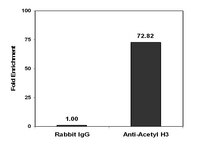16-661 Sigma-AldrichMagna ChIP™ Protein A Magnetic Beads
Recombinant Protein A covalently bound to magnetic beads for use in chromatin immunoprecipitations (ChIP assays). These protein A beads provide users a more rapid, reproducible & efficient reagent for collecting immunocomplexes vs. agarose beads.
More>> Recombinant Protein A covalently bound to magnetic beads for use in chromatin immunoprecipitations (ChIP assays). These protein A beads provide users a more rapid, reproducible & efficient reagent for collecting immunocomplexes vs. agarose beads. Less<<Recommended Products
Áttekintés
| Replacement Information |
|---|
| References |
|---|
| Product Information | |
|---|---|
| Presentation | Liquid suspension. Supplied as magnetic bead slurry in phosphate buffered saline, pH 7.4, containing 0.01% Tween®-20 and 0.09% sodium azide. |
| Quality Level | MQ100 |
| Biological Information | |
|---|---|
| Analytes Available |
|
| Physicochemical Information |
|---|
| Dimensions | |
|---|---|
| Particle Size | ~3 µm |
| Volume | 1 mL |
| Materials Information |
|---|
| Toxicological Information |
|---|
| Safety Information according to GHS |
|---|
| Safety Information |
|---|
| Storage and Shipping Information | |
|---|---|
| Storage Conditions | Stable for 1 year at 2-8°C from date of shipment. Do Not Freeze. |
| Storage Temperature | 2 to 8 °C (Do not freeze) |
| Packaging Information | |
|---|---|
| Material Size | 50 reactions |
| Transport Information |
|---|
| Supplemental Information |
|---|
| Specifications |
|---|
| Global Trade Item Number | |
|---|---|
| Katalógusszám | GTIN |
| 16-661 | 04053252471063 |
Documentation
Magna ChIP™ Protein A Magnetic Beads MSDS
| Title |
|---|
Magna ChIP™ Protein A Magnetic Beads Certificates of Analysis
References
| Reference overview | Pub Med ID |
|---|---|
| The tumor suppressor p53 and histone deacetylase 1 are antagonistic regulators of the cyclin-dependent kinase inhibitor p21/WAF1/CIP1 gene. Lagger, Gerda, et al. Mol. Cell. Biol., 23: 2669-79 (2003) 2003 Kivonat megmutatása | 12665570
 |
| Distinct roles for Sp1 and E2F sites in the growth/cell cycle regulation of the DHFR promoter. Jensen, D E, et al. J. Cell. Biochem., 67: 24-31 (1997) 1997 | 9328836
 |
Brochure
| Title |
|---|
| Shaping Epigenetics Discovery - Epigenetics Product Selection Brochure |
Technical Info
| Title |
|---|
| Getting started with ChIP-seq: experimental design to data analysis |
| White Paper - The Message in the Marks: Deciphering Cancer Epigenetics |









